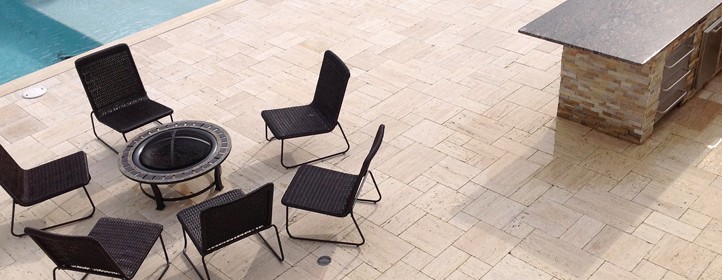
If you have decided that Classic Turkey travertine will be the perfect addition to your home, either as a stunning driveway or a classy alfresco area, there may come a time when you’re second guessing your choice. Like all types of stone paving, travertine has its fair share of advantages and disadvantages. Read on to ensure that you’re completely satisfied with this choice.
- Cheaper than marble or granite
Many homeowners steer clear of marble and granite because of how expensive they can be. Never fear – travertine can provide a similar look without the exorbitant costs. If you’re on a budget but don’t want to sacrifice on style or elegance, this could be the solution.
- Different colours and tones are available
Travertine is available in several different colours and tones, which allows you to choose the one that best complements your landscaping and façade. It’s also available in a variety of attractive finishes, including: polished, matte, brushed and tumbled.
- Very durable
This stone paving is known for being incredibly durable, so it doesn’t take much care and maintenance to keep it looking its best. When handled with care, you’ll find that it doesn’t crack easily at all and that the finished product will stand the test of time.
- Replacement is easy
Whilst it’s true that this stone is incredibly durable, it doesn’t mean that accidents won’t happen. As it has so many variations, you should be able to find very similar looking pavers or even invest in a few extras at the time of installation to make replacement a breeze.
- Environmentally friendly
Did you know that Classic Turkey travertine is more eco friendly than other natural stone materials? Since these pavers don’t have to go through the manufacturing process and are deposited around geothermally heated hot springs, it’s perfect for going green.
Cons
- Porous structure
Travertine has a porous structure, which means that it has a lot of holes in it. After a while, exposure to air and moisture can cause these holes to tear, making it easy for the surface to wear in the long run. Even though the holes are small, they can be quite noticeable.
- Highly reactive to acidic substances
This stone paving has a high sensitivity towards acidic substances (such as coffee, alcohol, vinegar and orange juice). If you accidentally spill one of these liquids onto the surface, there is the risk of permanent staining as the acid reacts with the calcium carbonate of the paver.
- Vinegar and salt are not suitable
If you’re the kind of person who prefers to use natural cleaning agents, you will need to steer clear of vinegar and salt when it comes to your travertine. The porous structure of the stone will suck up the vinegar, leaving a permanent stain that is unsightly.
- Heavier than other stones
If you’re hoping for a quick and easy installation process, this stone may not be the one for you. The paving tends to be naturally heavy, which means that it can be difficult and time consuming to install. The fee to deliver them to your house may also be higher.
We hope that the above list of pros and cons has enabled you to conclude whether Classic Turkey travertine is the preferred choice for your stone paving project or not. Whilst travertine is certainly a beautiful natural stone, it won’t necessarily be the best choice for every home and project. If you require more information, be sure you ask an expert.
